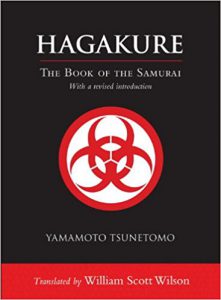 I was first introduced to Hagakure – The Book of the Samurai via the movie Ghost Dog: The Way of the Samurai (one of my favorite flicks). In that movie, the main character “Ghost Dog” (played by Forest Whitaker) carries around the book Hagakure, and the movie is interspersed with passages from the book read by Ghost Dog as narrator. The book is a collection of thoughts by Yamamoto Tsunetomo, compiled after the death of his master, and Tsunetomo had retired to the mountains. In this book he expresses a lifetime of thinking on the nature of what it means to be a warrior, and how to live in a truthful manner (aka, following “The Way”). As martial artists we look for truth in action, and Tsunetomo sought to also find truth in life, indicating that this is how a warrior should strive to live.
I was first introduced to Hagakure – The Book of the Samurai via the movie Ghost Dog: The Way of the Samurai (one of my favorite flicks). In that movie, the main character “Ghost Dog” (played by Forest Whitaker) carries around the book Hagakure, and the movie is interspersed with passages from the book read by Ghost Dog as narrator. The book is a collection of thoughts by Yamamoto Tsunetomo, compiled after the death of his master, and Tsunetomo had retired to the mountains. In this book he expresses a lifetime of thinking on the nature of what it means to be a warrior, and how to live in a truthful manner (aka, following “The Way”). As martial artists we look for truth in action, and Tsunetomo sought to also find truth in life, indicating that this is how a warrior should strive to live.
Hagakure is one of those books that can be picked up and started at any page. Each of it’s small vignettes is essentially a self contained expression of truth as Tsunetomo understands it. Throughout the book he seems very concerned with how we speak, what it reveals about us, and how it shapes us. He talks about the importance of getting our inner dialogue to match our goals and believes that anything can be done with correct focus and determination. These passages echo some current ideas in philosophy and psychology indicating that we can change our lives by changing our inner thoughts.
From the book:
When one’s own attitude on courage is fixed in his heart, and when his resolution is devoid of doubt, then when the time comes he will of necessity be able to choose the right move. This will be manifested by one’s conduct and speech according to the occasion. One’s word is especially important. It is not for exposing the depth’s of one’s heart. This is something that people will know by one’s everyday affairs.
Along these same lines he speaks of the importance of gathering your courage, and believing you are superior in battle, and by doing so you will be lead to victory. There is a lot in this book that speaks to the importance of having the will to succeed through conviction and self confidence.
Another interesting point he touches on is how he thinks that compassion is more important than wisdom and courage (and succeeds an understanding of) . This likely goes hand in hand with his idea that until the age of 40 the Samurai’s main goal is to increase his vitality, and after 40 he has enough experience to develop wisdom and compassion.
Hagakure – The Book of the Samurai is one of those rare books full of wisdom that would apply to any reader. What sounds like a book on martial arts turns out to be an instruction manual for life. If you read it you will surely find it useful in your life.
I’ll leave you with one last bit of wisdom from Tsunetomo:
A warrior should be careful in all things and should dislike to be the least bit worried. Above all, if he is not careful in his choice of words he may say things like “I’m a coward,” or “At that time I’d probably run,” or “How frightening,” or “How Painful.” These are words that should not be said even in jest, on a whim, or when talking in one’s sleep. If a person with understanding hears such things, he will see to the bottom of the speaker’s heart. This is something that should be carefully thought about beforehand.
